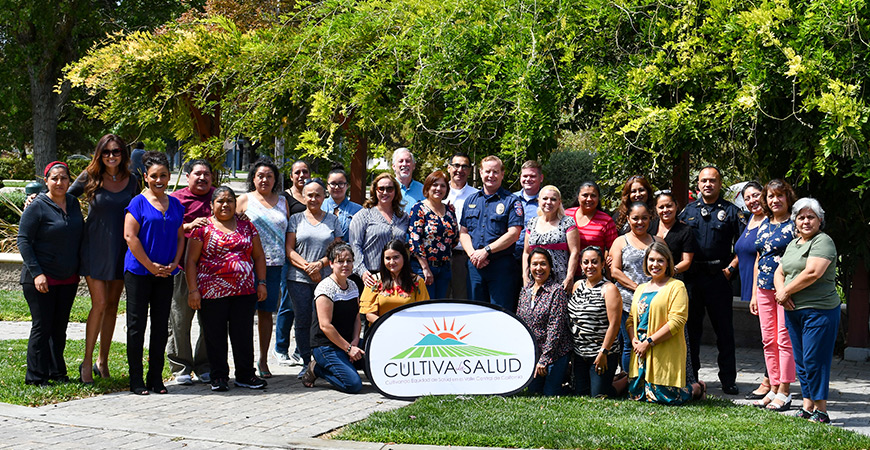
A new coalition of universities and community partners across the state — including UC Merced —aims to address the COVID-19 pandemic in communities that are disproportionally affected.
A $4.1 million grant from the National Institutes of Health’s Community Engagement Alliance Against COVID-19 Disparities has supported the formation of STOP COVID-19 CA (Share, Trust, Organize Partner, the COVID-19 California Alliance). The Alliance’s goals are to reduce disparities in understandings of COVID-19; increase participation of all Californians, including underrepresented populations, in prevention, vaccine and therapeutic trials; and improve uptake of approved vaccines.
Professor and Department of Public Health Chair Nancy Burke is the UC Merced site lead, and she is working with Claudia Corchado, program manager for Cultiva La Salud of Merced County, an organization dedicated to creating health equity in the San Joaquin Valley by fostering changes that support healthy eating and active living. Corchado has cultivated a network of about 200 women who serve the community, and they plan to work with others in the region to develop messaging to engage those most at risk in the San Joaquin Valley in COVID-19 prevention.
“We need to ensure that access to testing is equitable and that people can find and understand the information they need about COVID-19,” Burke said. “The messaging around vaccines, especially, is problematic. There’s a lot of misinformation, so once we do have a safe vaccine, we’re going to have to make sure misinformation does not prevent people from getting vaccinated. And that’s why we need to partner with organizations like Cultiva la Salud that have built trust over years of working in the community. For many people in our region it’s more about the messenger than the message.”
Though efforts have been made to expand outreach, testing and healthcare to Latinx, Indigenous and other underserved communities, one issue informational efforts like this face is trust.
Corchado said the Powerful Women’s group (Mujeres Poderosas) — women from around the county who have graduated from a yearlong civic-engagement training program — are vital to the project. They have already established themselves in their communities as trusted sources of information and as people who effect positive change.
“The work doesn’t happen overnight. Now, more than ever, there’s a fear of any government agency among Latinos,” Corchado said. “And there is a language barrier. We need to ensure people are getting the correct, consistent and safest messages in ways they can understand. Not everyone is literate in their own language, so we’re going to have to be creative in how we ensure the hardest to reach obtain the right information.”
The Powerful Women’s group meets every other week, and a nurse regularly provides them with updates on COVID-19. Ten of these Powerful Women will be hired for this one-year program to help get information to and gather information from people in Fresno, Merced and Stanislaus counties. They’ll reach out through their networks to learn where people get their information, what sources they trust, how much they understand about the virus and what concerns are most prevalent around vaccines.
“We’ll be holding focus groups and are forming an advisory board with the California Health Collaborative, Healthy House, Golden Valley Health Centers, local public health departments and others to see how we can best address challenges in testing and vaccine-hesitancy,” said Burke, a medical anthropologist who studies health disparities and health behaviors, among other topics. “We want to hear about people’s experiences with COVID and with testing and learn about their understanding of the disease and vaccine development.”
Other campus researchers will be involved in the effort, including Professor Irene Yen, a social epidemiologist whose work focuses on the social determinants of health, including the intersections of race/ethnicity and social class. Postdocs, graduate students and undergraduates will also help, and Burke said she expects other researchers will sign on once they hear more about the project.
“Some of the SJV PRIME students have expressed interest in working with us too,” she said.
Researchers at UCLA lead the effort that involves seven UC campuses, including five medical campuses, as well as four other academic institutions. They hope to capitalize on strong community-based partnerships to help address issues local to each area, but also learn how to apply these approaches to disadvantaged communities across the country.
The program is funded for one year at this point, so everything is on a fast track, Burke said.
“People will have to be flexible and adaptable to a rapidly changing environment, but it’s going to be exciting,” she said.



